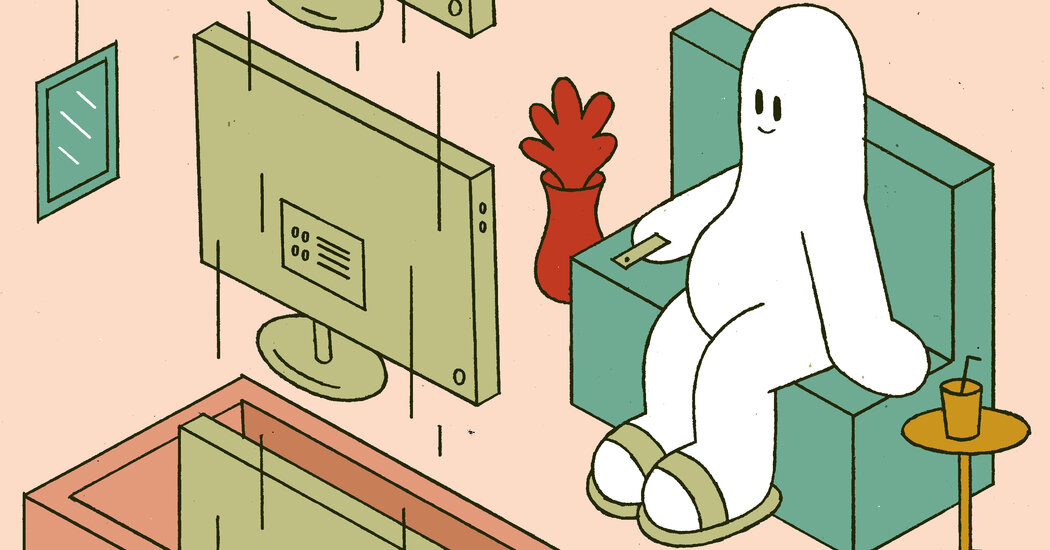Many more people are jumping from one streaming subscription to another, a behavior that could have big implications for the entertainment industry.
…
Americans are getting increasingly impulsive about hitting the cancellation button on their streaming services. More than 29 million — about a quarter of domestic paying streaming subscribers — have canceled three or more services over the last two years, according to Antenna, a subscription research firm. And the numbers are rising fast.
The data suggests a sharp shift in consumer behavior — far from the cable era, when viewers largely stuck with a single provider, as well as the early days of the so-called streaming wars, when people kept adding services without culling or jumping around.
Among these nomadic subscribers, some are taking advantage of how easy it is, with a monthly contract and simple click of a button, to hopscotch from one service to the next. Indeed, these users can be fickle — a third of them resubscribe to the canceled service within six months, according to Antenna’s research.
“In three years, this went from a very niche behavior to an absolute mainstream part of the market,” said Jonathan Carson, the chief executive of Antenna.
I really don’t understand why streaming business are so surprised. They are providing television for rent and users are renting it plain and simple.They seem to think they are entitled to lengthy subscriptions from users when in reality they aren’t providing a service that’s even stable or worth it.
deleted by creator
I would be happy to keep subscribing for a reasonable price. But I’m starting to trim the fat as they continue to price gouge.
Just the fact that the author here is using the word “impulsive” in conjunction with canceling services tells me that this is just guilt based propaganda trying to put a negative spin on this. No thanks, you can fuck off.
Americans new habit: Being poor.
Wasting money on impulsive grocery purchases like vegetables and bread when they could be subscribing to every streaming service.
It just makes economic sense.
The data suggests a sharp shift in consumer behavior — far from the cable era, when viewers largely stuck with a single provider, as well as the early days of the so-called streaming wars, when people kept adding services without culling or jumping around.
Yeah, turns out when the monopolies are eliminated, people get more competition and a better deal on the consumer end. It’s why I’ll never understand people who say streaming services became as bad as cable.
One option for slowing the churn, executives think, is to bring back some element of the cable bundle by selling streaming services together. Executives believe consumers would be less inclined to cancel a package that offered services from multiple companies.
No, I’m less likely to cancel a service that’s worth what you charge for it. Be happy you got one month out of me, and if you want more, offer me more value. Putting serialized shows out week by week doesn’t do it for me either, because I’m just going to wait until the season is done to start watching it anyway.
Price sensitivity is also a factor. Americans with a streaming subscription are spending an average of $61 a month for four services, an increase from $48 a year ago, according to a new study by Deloitte. The increase was due to higher prices, not additional services. Nearly half the people surveyed said they would cancel their favorite streaming service if monthly prices went up another $5, the study said.
Mystery solved.
Yeah, turns out when the monopolies are eliminated, people get more competition and a better deal on the consumer end. It’s why I’ll never understand people who say streaming services became as bad as cable.
I’d argue that streaming is in such a bad place right now because each streaming service has a monopoly on their own content. Sure, you could argue that studios “compete” with each other on the content they produce, but I’d argue that cable companies were a different layer of the stack entirely. Cable companies all offered the same channels and the same content, and in areas where they did overlap, competition to offer the best delivery of those channels was great. What made cable bad was that there was little incentive for companies to geographically compete. In the era of streaming, companies have little incentive to allow their content to compete across platforms.
If you ask me, every streaming platform should be broken up from their production parents, so that streaming companies can compete on what they offer, and how they deliver it. There is no incentive for the platforms themselves to compete with each other. It’s all about how hard the services can enshittify before people stop watching the content they have a monopoly on.
Copyright is a government granted monopoly.
So the fragmentation is not surprising: each economic agent used their government granted monopoly on some content to make sure nobody else could distribute that content and, because of the monopoly of copyright unlike with, for example, cooking oil or soap, nobody can set up a business that just buys it on one side from several different “factories” to sell it on the other on a single shop front.
There are lots of massive market distortions in the area of content exactly because its foundation are government granted monopolies with no obligation for fair access selling, resale or second-hand sale.
Cable companies still did the same practice too though, and even the ones that weren’t cable providers still negotiated with the providers that if you got channel A in this tier of service, you must also get channel B, and then Disney brings in a certain amount of money per channel in a given bundle every month. No matter how you slice it, even with the problems above, what we’ve got now is better.
The data suggests a sharp shift in consumer behavior — far from the cable era, when viewers largely stuck with a single provider,
What a stupidly obsequious statement. You didn’t change providers because you couldn’t. It wasn’t until satellite TV took off in the late 90s that people started having options for more than one subscription TV provider.
And now these financial geniuses are talking about bundling, when the whole reason this “problem” exists in the first place is because all of them yanked their content off Netflix to start their own streaming channels in the belief that they could be as profitable and as successful. Maybe they should try listening to what consumers want?
I prefer the weekly release schedule of shows. It’s something to look forward to and something to talk about week to week. A lot of people don’t want to hear spoilers either. Releasing all at once leads to that.
I do think there are those who would subscribe instantly instead of waiting for all shows to be released. Not everybody, but enough of them to stay for two to three months instead of just one and done.
Viewers didn’t stick with a single provider in the cable era.
They were stuck with a single provider.
This is exactly what I came to mention. It’s not like you had a choice. The cable mafia only allowed one provider per area.
So I was thinking about subbing to Netflix again to watch something, and they had already deleted my account (it’s been about a year). So I went to my email to just try and verify that I was trying to login using the correct email address.
While doing this I found a statement from 2018. The price of Premium Netflix then was $13. Now it’s $23 I think. And they cracked down on password sharing so the service isn’t even as good, really.
Every one of these services has raised prices over and over, boiling us frogs in the pot, so it’s no wonder everyone now just subs for a month or two then bounces. It’s smart. The companies here are the stupid ones, chasing the all-mighty “line-go-up” quarterly statement MBA shit when they could have had loyal customers for years and years. I think I had a Netflix account for at least a decade or more (back when it was just mailing DVDs) until they started jumping the price by a few bucks every six months. It’s just not worth it to keep services around waiting for a show or two to come back.
Tbf, Netflix - along with Blockbuster - really was one of the pioneers in offering streaming services, when nobody else would. And it is not their fault that ISPs decided to throttle them, essentially holding their entire business hostage until they ponied up more dough, and now the content providers are doing the same. Also, most of the time they tend to grandfather people into older plans, so whatever the price is they usually (tbf, not always) tend to honor for many years in the future.
I am perpetually a year or less away from cancelling my own subscription b/c of how they continually skirt the line of pushing forward to do things like adding in “advertisements”, but then walking back to make them more bearable before they start losing customers like me in droves. So I am not exactly a full-on “fan” of Netflix, just trying to offer a balanced perspective.
They also did put in the work to make a SUPERB player, plus invested heavily in making apps for physical devices. It was only this year that I finally stopped being able to play Netflix on my 9-year-old TV, and even that has a heavy chance of being more the fault of the device itself (I mostly don’t care b/c my Chromecast still works just fine). Plus I still can do things like e.g. go workout in a gym while watching a pre-downloaded Netflix video without needing to use any of my mobile data, all that needing virtually no setup at all, unlike e.g. piracy that would require paying for a VPN and investigation into what mobile apps are available, plus constant monitoring to see if they remain trustworthy (so many famous examples of apps that got taken over from the inside by a malicious update).
Even so I may still leave it in a year or two, regardless of whether it is their fault or not, b/c I am not sure that I am getting anywhere close to the “value” for the amount that they are charging, anymore:-(. Seeing shows come out like Stranger Things gave me some hope, but then watching that same show enshittify itself immediately for the sake of chasing after profits to the exclusion of all else quickly killed it.
Though in that case I will need to research some alternatives…
Having used Disney and Paramount apps, I’m blown away by how much better the Netflix user experience is.
I have never seen those others but damn, that… does not sound good:-|.
I’ve practically never had a connection issue with Netflix:-). Among the shit-ton of evil companies out there, they are themselves no shining angels but… they don’t seem nearly as bad as the rest of them imho.
I mean their selection keeps getting worse, but the app is responsive and intuitive, which is more than can be said for either of those other ones.
My thoughts about Netflix are the same: I am less than happy about the content - which is beyond their control - but very happy with the apps that they offer that is totally within their control.
I think Blockbuster became a legend of failed business strategies because it didn’t offer streaming when no one else would. They waited until Netflix grabbed all the momentum for streaming to try their own, sad service.
Tbf Netflix barely managed to accomplish it either, at the start, so it must have been an extremely difficult task. Internet speeds, and more importantly reliability, were huge obstacles, but far more so were the labyrinthine rules and regulations of dealing with the content providers, which are still the top obstacles to people enjoying watching television entertainment today.
This video about it basically launched John Olivier’s career in his at-the-time new show Last Week Tonight. If you don’t want to watch it all, fast-forward to 4:08 and look at that graph, showing how Netflix was taken hostage from the ISPs for a few months until they caved and paid the additional premiums demanded (as he called it, a “mob shakedown”) - though you really may enjoy watching the rest of it after that! (warning to any capitalists that watch it: you might not be by the time you get to the end…:-P)
So… I think I disagree with your language: it wasn’t just that they “didn’t” so much as they simply “couldn’t” manage to get it done, maybe b/c they were not willing to be shitty enough? :-P
deleted by creator
deleted by creator
Subscribe? You mean torrent?
This is a good thing. No matter how they try to paint it. I only stuck with some when interest and content waned because I was grandfathered in. When Netflix etc. took that away it made dumping them an easy decision. Not an “impulsive” one. There’s no point in being loyal to these companies. Especially when they pulled this shit after previously they claimed we were locked in on that pricing and started forcing ads. Greedy bastards.
Netflix is the only one I don’t cancel but I get a free sub through my provider. The rest come and go at my whims.
Yarr
This be the way maties!
It’s the only practical option. Unless we get cable like packages (which I wouldn’t be surprised to see soon), nobody wants to pay for some 10+ subscriptions for 1-2 shows on each platform. But if you cycle a couple subscriptions every few months, it’s the same (cheaper) cost year round, but you get all the content you want.
Having described it, I think that’s probably why we’re seeing more and more shows returning back to weekly releases - that model keeps the subscribers on the hook for longer. We can always just wait till it’s done, of course, but there’s a number of factors that can pressure viewers into remaining subscribed.
You don’t want to pay $150/month for 10 different streaming services with one show you want to watch each??
I wholly agree but I think the weekly model is about more than money. It gives fans time to talk about each episode and have fun conversations speculating on what comes next. I much prefer that. When 10 episodes are released at once, people binge it over a weekend and the buzz is gone a month later. Single episode releases make for a ton of free word-of-mouth marketing
Removed by mod
Not a chance that’s gonna last. The next step is you must buy 3,6, or 12 months at a time. We already have streaming services doing channels and ad breaks. Cableless TV will be the circle completing.
To me this is the way the streaming companies have designed it, with fracturing content.
Yep. They should have settled for passive income and left their content on Netflix.
I’ve been waiting for the services to start requiring a year commitment or something equally dumb to prevent this behavior. I subscribe under two conditions : There is something I want to watch, and all the episodes are available. Once I’ve finished the content I subbed for, what is my incentive to stick around, exactly?
Unfortunately for streamers they can only churn out a season of my favorite shows every 2-3 years, and I’m not really about paying for availability to content that doesn’t interest me. Especially while those rates have doubled and tripled.
[Streaming services raising prices, producing garbage, canceling good shows, losing access to shows, straight-up deleting entire shows for a tax write off.]
“Why have consumers suddenly changed in only three years??? Inexplicable!”
Cancelled all services a couple months ago that offer an ad+sub tier. I’m ok with ads for free or sub, but mix them and that kind of greediness like cable TV i can’t abide. It’s given me more time for other hobbies I’d rather be doing anyways.















